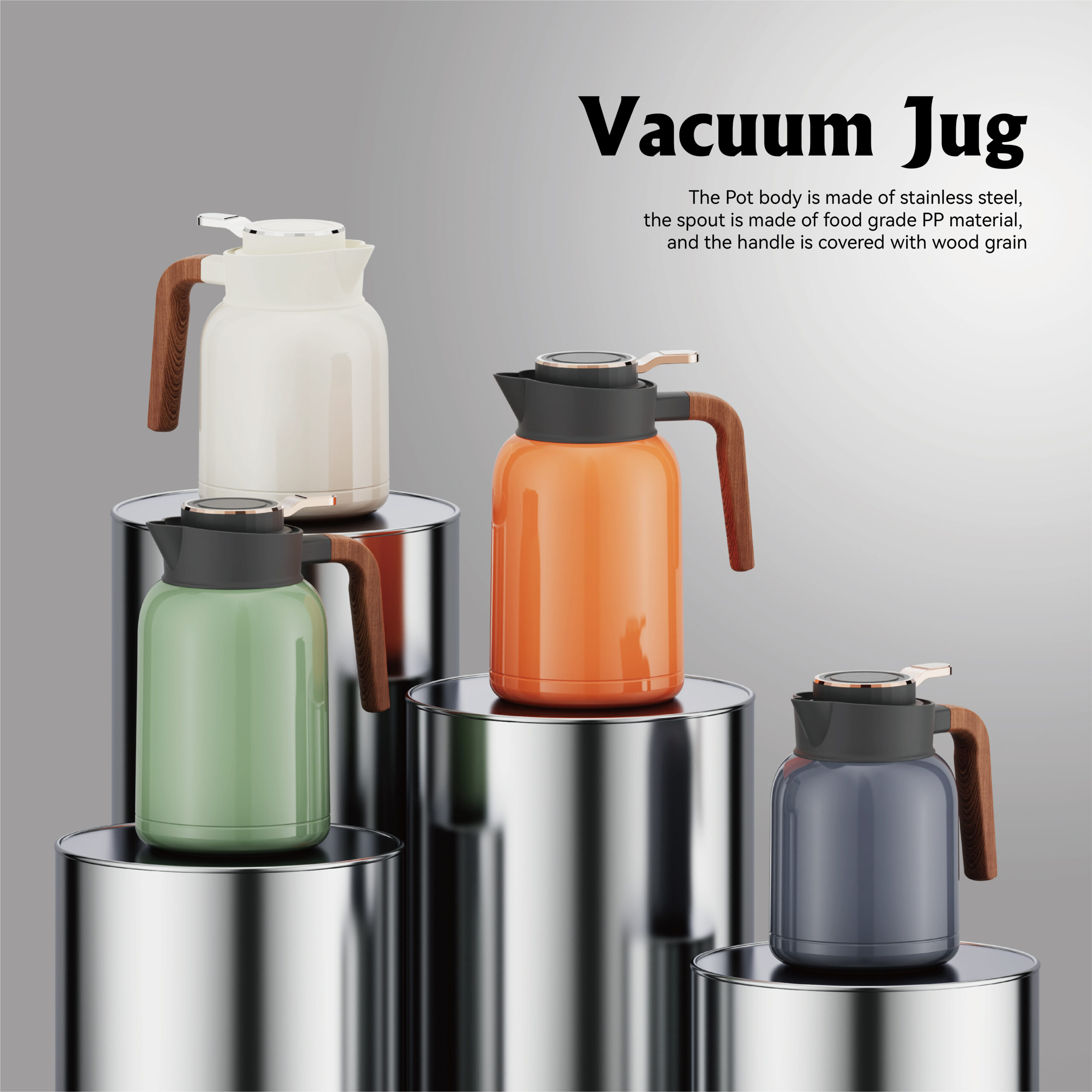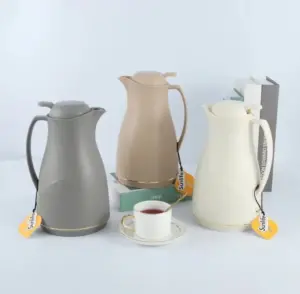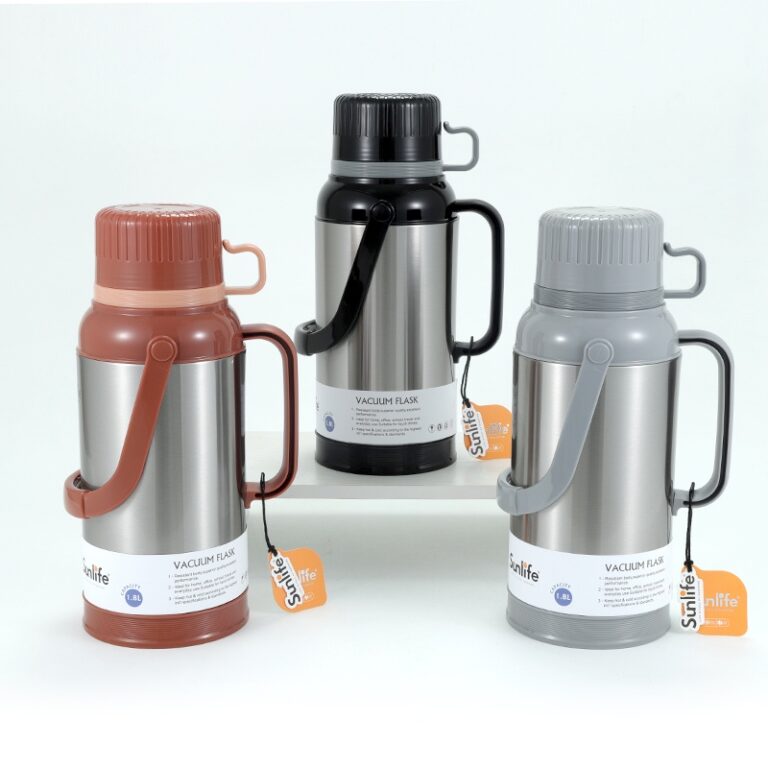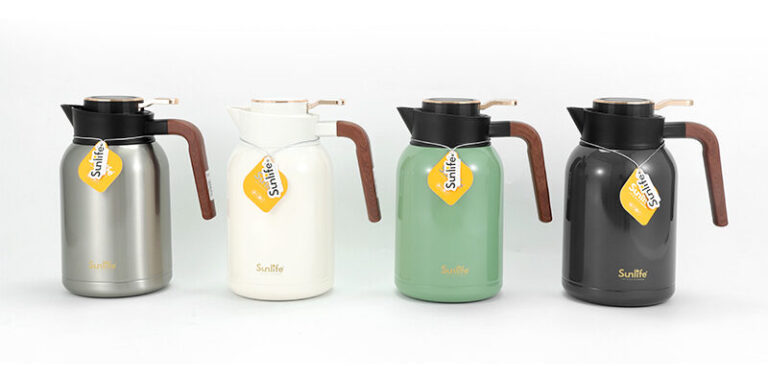When choosing a bottle that can keep drinks at the right temperature, it is very important to be safe to use for a long period of time. Therefore, one has to really think hard about the material it is made of. This blog will outline types of plastics in thermos bottles and will also touch on durability and safety attributes.
Understanding the Plastics in Your Vacuum Flask
It is important that one understand the materials in your vacuum flask before really getting down to the nitty-gritty. What kind of material it is will affect how well your thermos keeps drinks hot or cold. There are types of plastics each with unique properties and being familiar with these differences can help you pick a thermos that fits your needs just right.
Why Material Matters
The design of your thermos flask is not all about the looks. It also plays a role in how well it will retain the temperature of your drinks over time and also in ensuring its durability and safety for use daily. The core function of a thermos flask is to maintain your drinks at the desired temperature for as long as possible in which case materials used play an important part in this aspect. Certain types of plastics are not so good insulators from heat loss, while others might leach substances into your hot drinks.
Common Types of Plastics
Every time something relates to plastic body vacuum flasks, a few kinds of plastics are common: for example, polypropylene-PP for specific qualities, PET, HDPE and PVC, may also be used. All of them have certain advantages and disadvantages. Knowing these variations could help you choose which flask suits your needs.
PP Plastic (Polypropylene)
Polypropylene plastic is a polymer that can be extensively utilized for various purposes due to the strength it exhibits and versatility it displays. It attains this virtue through its lightweightedness, a feature which includes high resistance to temperature without causing any odor or smell that may be released along with foods if used for keeping food items in utensils or covered insulated bottles.
Other Plastics – PET, HDPE, PVC
The common plastics found in food storage containers are PET, HDPE and PVC. PP plastic is also noted for its toughness and insulation in vacuum flasks, where other plastics might have potential problems with cracking or leakage after a long period of time. Besides that, durability can be reduced with time and increase the possibility of fissures, leakage, which can also affect their performance for retaining heat for a longer period. One should know that when exposed to high temperatures, some plastics can leach chemicals into drinks, which raises concerns over their safety and health impact.
Durability and Longevity
The durability of your thermos flask is a factor in assessing its value as a product in general. A robust thermos should survive use well and accumulate years of service.
Quality of Material
The material of your thermos will also affect the longevity and durability over a period of time. Some plastics will eventually wear out after many uses, while others will be resilient for long periods of time. The material can make your thermos not only more durable but also more efficient in retaining heat. Therefore, considering the impact of the materials on your thermos longevity is essential.
How PP Plastic Resists Wear and Tear
The fact that PP plastic is durable is well acknowledged and this material has been put to great use in several areas where strength and resilience are key, including vacuum flasks. Durability is an important aspect, given the fact that drops or impacts are handled without losing shape or integrity over time. It prevents cracks or leakage from taking place. Therefore, it’s reliable for maintaining the temperature of a drink accordingly.
Limitations of Other Plastics
Unlike PP plastic, which is characterized by resistance and durability over time, as compared to those plastics that can wear down with time and eventually crack or leak, thus losing their insulation capabilities due to degradation under certain conditions, such as extreme temperatures or frequent handling, it creates a serious threat-not only to the structural integrity of the flask but also to its insulation properties regarding keeping your beverages at the desired temperature.
Safety and Health Considerations
When you’re using a flask or a similar container for your beverages and snacks while you’re out and about or at home, comfort is Ensure that the materials are safe for food use and won’t release any harmful chemicals into your treats while also maintaining their ideal temperature for extended duration.
The Issue of Chemical Leaching
Worries emerge regarding the transfer of chemicals from plastics when they come into contact with heat, when in contact with liquids, which can result in the emission of hazardous substances into your beverages and present health hazards as a result of possible contamination of your drink with these chemicals that may affect its purity and safety precautions are necessary to safeguard your health by opting for materials that are less likely to leach harmful substances.
Why PP Plastic is a Safe Choice
PP plastic is well regarded for its safety credentials since it’s labeled as food grade and does not contain any substances like BPA that could leach into liquids or food when exposed to heat, ensuring the integrity of your drinks remain intact while in storage or use. Additionally, PP plastic’s resistance to absorbing liquids helps prevent the growth of bacteria and mold.
Risks Associated with Other Plastics
Certain types of plastics such as PET or HDPE may not be as safe as PP plastic for storing beverages because they could contain substances, like BPA, that have the potential to seep into your drinks and pose health hazards. When selecting a thermos, it’s crucial to avoid these plastics since temperature fluctuations can affect the release of these chemicals. Higher temperatures can result in a likelihood of these chemicals leaching into your beverage.
Heat Resistance and Performance
The durability of a thermos in withstanding heat is crucial for its performance efficacy as it ensures the prolonged retention of warmth in your drinks while enhancing safety during use.
The Superior Heat Resistance of PP Plastic
PP plastic demonstrates heat resistance in comparison to other types of plastics. It has the ability to endure high temperatures without distorting or deteriorating. This makes it a great option for containing hot beverages like coffee, tea or soup. This ability to withstand heat not only guarantees the durability of your flask but also aids in preserving its insulating qualities, which in turn keeps your drinks warm for a prolonged time period.
Why Other Plastics May Not Be Suitable for Hot Liquids
Certain plastic varieties like PET and HDPE might not be the choice for storing drinks because they are less resistant to high temperatures than PP plastic material is likely to degrade and release harmful substances into your beverages. As a result, of these safety and reliability considerations for containing beverages in plastics like PET and HDPE are seen as less preferred choices due to their limitations in such scenarios.
Identifying Safe Plastic
When buying a vacuum flask, it should be a concern for the labels and certification showing the plastic is food-grade. This material is safe to come in contact with either food or drinks, as it contains no toxic chemicals that might change either the taste or quality of your drink. It must be labeled as being free of BPA, which is known to be hazardous to a user’s health.
ZheJiang WeiLai Daily Necessities Co., Ltd: Reliable Supplier
ZheJiang WeiLai Daily Necessities Co., Ltd. is dedicated to crafting and marketing cups and flasks worldwide under renowned brands. For than 23 years in the industry, they provide a range of products tailored to customer requirements. Their team of designers and developers is committed to crafting over 100 products with patents. Quality and customer happiness are their focus as they deliver top notch and affordable products.
FAQs
1. Are all plastic vacuum flasks safe to use?
It’s advisable to choose the flasks made of food-grade PP plastic without BPA.
2. What are the benefits of using PP plastic for vacuum flasks?
It possesses outstanding durability, resistance to heat and wear and tear. Besides, it is lightweight and recyclable, hence environmentally friendly.
3. How will I know if my plastic vacuum flask is made of PP plastic?
Please ensure from the product label or review the information provided by the manufacturer and check for any certification or symbols that will prove they conform to standards on food safety.









